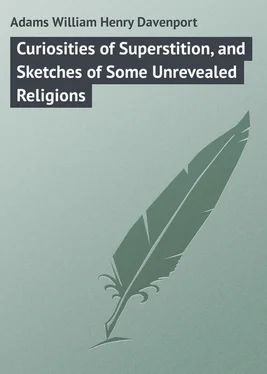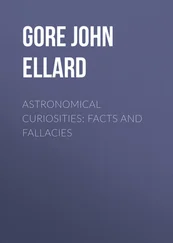William Adams - Curiosities of Superstition, and Sketches of Some Unrevealed Religions
Здесь есть возможность читать онлайн «William Adams - Curiosities of Superstition, and Sketches of Some Unrevealed Religions» — ознакомительный отрывок электронной книги совершенно бесплатно, а после прочтения отрывка купить полную версию. В некоторых случаях можно слушать аудио, скачать через торрент в формате fb2 и присутствует краткое содержание. Жанр: foreign_language, foreign_prose, на английском языке. Описание произведения, (предисловие) а так же отзывы посетителей доступны на портале библиотеки ЛибКат.
- Название:Curiosities of Superstition, and Sketches of Some Unrevealed Religions
- Автор:
- Жанр:
- Год:неизвестен
- ISBN:нет данных
- Рейтинг книги:4 / 5. Голосов: 1
-
Избранное:Добавить в избранное
- Отзывы:
-
Ваша оценка:
- 80
- 1
- 2
- 3
- 4
- 5
Curiosities of Superstition, and Sketches of Some Unrevealed Religions: краткое содержание, описание и аннотация
Предлагаем к чтению аннотацию, описание, краткое содержание или предисловие (зависит от того, что написал сам автор книги «Curiosities of Superstition, and Sketches of Some Unrevealed Religions»). Если вы не нашли необходимую информацию о книге — напишите в комментариях, мы постараемся отыскать её.
Curiosities of Superstition, and Sketches of Some Unrevealed Religions — читать онлайн ознакомительный отрывок
Ниже представлен текст книги, разбитый по страницам. Система сохранения места последней прочитанной страницы, позволяет с удобством читать онлайн бесплатно книгу «Curiosities of Superstition, and Sketches of Some Unrevealed Religions», без необходимости каждый раз заново искать на чём Вы остановились. Поставьте закладку, и сможете в любой момент перейти на страницу, на которой закончили чтение.
Интервал:
Закладка:
But, as Max Müller observes, the ancient religion of the Aryan inhabitants of India started, like the religion of Greece and Rome, of the Germans, Slavs, and Celts, with a simple and intelligible mythological phraseology. 2 2 Max Müller, Buddhism and Buddhist Pilgrims, pp. 5, 6.
In the Veda, the names of all the so-called gods or Devas undisguisedly betray their original physical character and meaning. Under the name of Agni (ignis) was praised and invoked the fire; the earth by that of Prithvî (the brave); the sky by the name of Dyu (Zeus, Jupiter), and afterwards of Indra; the firmament and the waters by the name of Οὐρανός. Under many appellations was the sun invoked, such as Sûrya, Savitri, Vishnu, or Mitra; and the dawn by the titles of Ushas, Urvasî, Ahanâ, and Sûrya. Nor was the moon forgotten: for though not often mentioned under its usual name of Kandra, reference is made to it under its more sacred appellation of Soma; and a particular denomination was reserved for each of its phases. There is hardly any fact of nature, if it could impress the human mind in any way with the ideas of a higher power, of order, eternity, or beneficence, – whether the woods, or the rivers, or the trees, or the mountains, – without a name and representative in the early Hindu Pantheon. No doubt there existed in the human mind, from the very beginning, something, whether we call it a suspicion, an innate idea, an intuition, or a sense of the Divine. What distinguishes man from the rest of the animal creation is chiefly his ineradicable feeling of dependence and reliance upon some higher power; that consciousness of bondage, from which the very name of “religion” was derived. “It is He that hath made us, and not we ourselves.” The presence of that power was felt everywhere, and nowhere more clearly and strongly than in the rising and setting of the sun, in the change of day and night, of spring and winter, of birth and death. But although the Divine Presence was felt everywhere, it was impossible, in that early period of thought, and with a language incapable as yet of defining anything but material objects, to conceive the idea of God in its purity and fulness, or to assign to it an adequate and worthy expression.
It must also be remembered that the influence of the genius and forces of Nature would necessarily be greater in an age when the human mind was occupied by few objects of thought, than now when it ranges over the whole world of art and science. Moreover, to the eye of ignorance everything seems large and portentous, or dim and inscrutable. The fire from heaven, the reverberating thunder, the gale that crashed down the mountain ravines and felled great trees before it, the planetary bodies steadily revolving in their courses, the stream with its glow and its ripple, the dense shadows of the haunted forest, the recurring rush and roll of the sea, – all these were things which for early man had a constant novelty and strangeness, and seemed incessantly to claim his reverent consideration. He could not account for them: whether a bane or a delight they were equally unintelligible. They represented, therefore, some Power which he could regard only with awe and reverence. And of that Power the sun would necessarily be the chief type and symbol. All life and love seemed dependent upon it. The trees throve, and the flowers bloomed, and the banks rippled, and the birds sang, and the harvests ripened, through the sun. It was the source of light and heat, of the vigour and activity of nature. While it shone men’s hearts leaped with joy, and the wheels of labour revolved with pleasant toil; but when it disappeared, and the darkness usurped the heavens, the spirits sank, and humanity felt in the change of scene a presentiment and presage of the darkness of death. All vitality, all motion centred in the sun. “It was like a deep furrow,” says Max Müller, “which that heavenly luminary drew, in its silent procession from east to west, over the fallow mind of the gazing multitude; and in the impression left there by the first rising and setting of the sun, there lay the dark seed of a faith in a more than human being, the first intimation of a life without beginning, of a world without end.” Who can wonder that the Chaldean, and the Celt, alike ascended to the high places, and paid their worship of symbolic fires to the great fountain of life and light, the central force of the universe? Who can wonder that all the Aryan tribes made it, so to speak, the nucleus of their religious systems? The Hindu peasant, centuries ago, addressed it in his heart in much the same language which Gawain Douglas afterwards employed. As its glorious orb rose above the gleaming horizon, he sent forth to it a message of welcome:
“Welcome, the lord of light and lamp of day;
Welcome, fosterer of tender herbis green;
Welcome, quickener of flourished flowers’ sheen;
Welcome, support of every root and vein;
Welcome, comfort of all kind fruits and grain;
Welcome, the bird’s green beild upon the brier;
Welcome, master and ruler of the year;
Welcome, welfare of husbands at the ploughs;
Welcome, repairer of woods, trees, and boughs;
Welcome, depainter of the bloomit meads;
Welcome, the life of everything that spreads.”
And because it was all this, and more, the Hindu saw in it something greater than a mere luminary, – a planetary body; he endowed it with Divine attributes, he made it a god, he gave it his worship, and by an elaborate symbolism kept it ever before him.
A necessary consequence of this deification of the sun was the deification of the other bodies that shared with him the firmament; but as they were inferior in splendour and utility, they naturally became recognized as inferior gods. And when once the religious feeling of humanity had gone thus far, its further development became only a question of time. The homage given to the stars was soon extended to the winds and streams and groves. A legion of gods sprang into existence, and for a while they seemed to satisfy the needs and aspirations of humanity. But as the thoughts of men expanded, as their intellect ripened with the ages, and grew strong enough to doubt, and bold enough to question the conclusions of the common faith, a revolt took place against “the contradictions of a mythological phraseology, though it had been hallowed by sacred customs and traditions.” Men grew tired of so complex and cumbrous a religious system, and having observed a definite fundamental unity of nature in spite of the diversity of its operations, they came to believe in a similar unity of the Divine Power. The idea of a supreme authority once entertained, men soon understood that supremacy meant oneness; that if there were a God over all, He must be one and indivisible. One of the earliest proclamations of this sublime truth is found in the Rig-Veda, which says: 3 3 Rig-Veda, i. 164, 46.
—
“That which is one the sages speak of in many ways – they call it Agni, Yama, Malarisvan.”
And again: 4 4 Rig-Veda, x. 121, by Max Müller.
—
“In the beginning there came the Source of golden light – He was the only true Lord of all that is – He stablished the earth and this sky: – Who is God to whom we shall offer our sacrifice?
“He who gives life, He who gives strength; whose blessing all the bright gods desire; whose shadow is immortality; whose shadow is death: – Who is the God to whom we shall offer our sacrifice?
“He who through His power is the only King of the breathing and awakening world; He who governs all, man and beast: – Who is the God to whom we shall offer our sacrifice?
“He whose power these snowy mountains, whose power the sea proclaims, with the distant river – He whose these regions are, as it were, His two arms: – Who is the God to whom we shall offer our sacrifice?
Читать дальшеИнтервал:
Закладка:
Похожие книги на «Curiosities of Superstition, and Sketches of Some Unrevealed Religions»
Представляем Вашему вниманию похожие книги на «Curiosities of Superstition, and Sketches of Some Unrevealed Religions» списком для выбора. Мы отобрали схожую по названию и смыслу литературу в надежде предоставить читателям больше вариантов отыскать новые, интересные, ещё непрочитанные произведения.
Обсуждение, отзывы о книге «Curiosities of Superstition, and Sketches of Some Unrevealed Religions» и просто собственные мнения читателей. Оставьте ваши комментарии, напишите, что Вы думаете о произведении, его смысле или главных героях. Укажите что конкретно понравилось, а что нет, и почему Вы так считаете.












